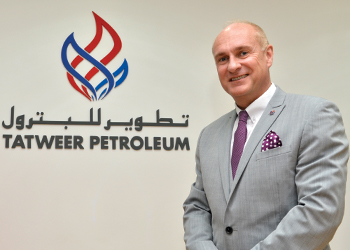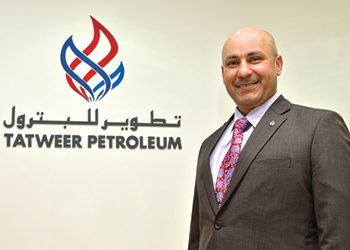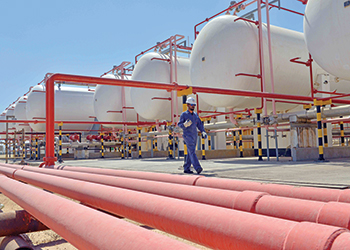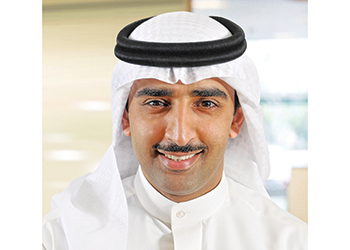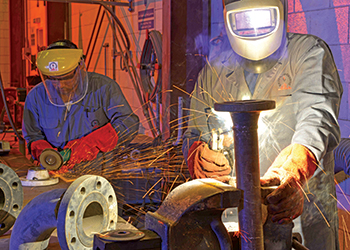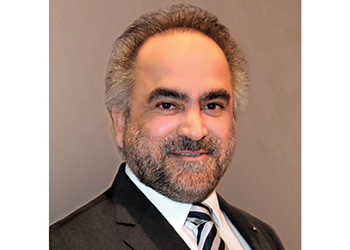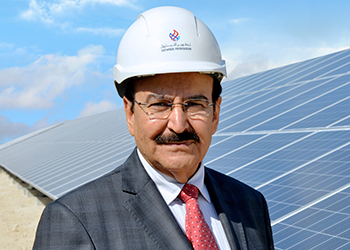
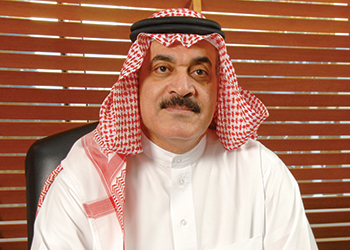 Dr Shaikh Mohamed ... the flat oil prices in 2016 will put further pressure on our operating margin
Dr Shaikh Mohamed ... the flat oil prices in 2016 will put further pressure on our operating margin
Cost rationalisation efforts – including deferring or cancelling projects – were stepped up during 2015 without compromising operational integrity, safety or security, says Banagas chief executive Dr Shaikh Mohamed Bin Khalifa Al Khalifa
Bahrain National Gas Company (Banagas) has stepped up its cost rationalisation efforts including deferring or cancelling projects to tackle the challenges posed by a volatile oil price market marked by significant and continued drop in oil prices.
Banagas’ sales revenue in 2015 slumped to $151 million after having clocked a ‘highly satisfactory’ performance during the year 2014 with net sales revenue touching $282 million – the third highest on record, Banagas chief executive Dr Sheikh Mohamed Bin Khalifa Al Khalifa told OGN in an exclusive interview.
"Due to the significant and continued decline in oil prices, Banagas’ sales revenue in 2015 slumped to $151 million. Whilst the company managed to record an operating profit for the year this was only achieved through the imposition of tough cost-reduction measures." he adds.
Meanwhile, it has selected five international engineering, procurement and construction (EPC) companies to participate in the tendering process for Phase 2 of the Bahrain Gas Plant Project. This Phase involves construction of a new pipeline and additional storage facilities at Sitra.
The companies participating in the tendering process are CB&I, JGC, Petrofac, Bechtel and Saipem. These have been selected from 32 EPC companies which had been invited to pre-qualify for the project, Dr Shaikh Mohamed says.
According to him, the tender documents have just been released to contractors during the week of February 21 to 25, 2016 while the evaluation and selection of the EPC contractor is expected by August 2016. Construction schedule from commencement to completion is projected as 28 weeks form the date of contract award, he reveals.
Giving details, he says: "A traditional Feed study was performed by Wood Group of Abu Dhabi and completed in December 2015. The scope will cover a pipeline system that will transport gas from Compressor Stations to the new Central Gas Plant (CGP), a transfer pipeline to return residue gas from the plant to the reinjection header and modifications to the Sitra Storage facility to accommodate the additional production from the gas plant. This includes installation of two additional storage tanks, one 200,000 barrels for propane and one 100,000 barrels for butane, and the addition of a refrigeration system."
The expansion will increase processing capability by 350 million cubic feet of associated gas. The Bahrain Gas Plant project is estimated to cost $530 million.
Excerpts from the interview:
How were the operational and financial results for Banagas 2015? Please give the company’s turnover, profits and revenue earned in 2015?
During 2014, the company’s operational and financial performance was highly satisfactory with the net sales revenue reaching $282 million, the third highest on record.
However due to the significant and continued decline in oil prices, sales revenue in 2015 slumped to $151 million. Whilst the company managed to record an operating profit for the year this was only achieved through the imposition of tough cost-reduction measures.
How did Banagas tackle the challenging year of 2015 when oil prices started failing? And what is the market outlook for 2016? What are the major challenges you will be facing over the next few years?
Cost rationalisation efforts were stepped up in 2015 without compromising operational integrity, safety or security. Wherever considered appropriate capital projects were deferred or cancelled and only critical projects were undertaken. We expect oil prices in 2016 to continue to remain flat putting further pressure on our operating margin. This will be further depressed by increases in utility costs as government subsidies are removed.
What is the current stage of Banagas Phase 2 expansion? How many firms have shown interest in the construction of a new gas processing plant and when will the contract be awarded?
For the Bahrain Gas Plant Project (CGP-III), the company adopted a Front End Engineering Design (Feed) competition between three companies (JGC, Technip and CB&I) in which the bidders prepared the Feed documents followed by an engineering, procurement and construction (EPC) proposal. Tenders from the three contractors were received and evaluated. JGC Corporation was selected as the EPC contractor.
Under the patronage of HE Dr Abdul Hussain Bin Ali Mirza, Minister of Energy, the contract to construct the new Gas Processing Plant in the Bahrain Oil Field was signed for $355 million between Bangas and JGC Corporation of Japan on January 27, 2016. The project is expected to be completed in 32 months with commissioning and startup scheduled for September 2018.
The next phase of the project is construction of field pipelines and additional storage facilities at Sitra.
A traditional Feed study was performed by Wood Group of Abu Dhabi and completed in December 2015. The scope will cover a pipeline system that will transport gas from compressor stations to the new CGP, a transfer pipeline to return residue gas from the plant to the reinjection header and modifications to the Sitra storage facility to accommodate the additional production from the gas plant. This includes installation of two additional storage tanks, one 200,000 barrels for propane and one 100,000 barrels for butane, and the addition of a refrigeration system.
Thirty two prequalification documents were received and evaluated and five companies (CB&I, JGC, Petrofac, Bechtel and Saipem) selected to participate in the tendering process. Tender documents have been released to contractors during the week of February 21 to 25, 2016.
Evaluation and selection of the EPC contractor is expected by August 2016. Construction schedule from commencement to completion is projected as 28 weeks form the date of contract award.
What will be the total cost of this project? What will be its objectives? How will Bahrain benefit from it?
The expected total costs inclusive of project execution and management is around $530 million.
The objective of the project is to process and maximise the recovery of marketable liquids (Propane, Butane and naphtha) from the additional 350 million standard cubic feet per day (mmscfd) of associated gas available from Bahrain Oil Field which is currently re-injected into the reservoir without processing. This will provide increased revenue to the Government of Bahrain and provide employment opportunities for Bahraini nationals.
What were some other new projects signed during the year? Please give details.
Beside the contract signing for gas processing plant in January, we expect to sign the contract for the field pipelines and Sitra storage project in the later part of this year.
What is the gas production and consumption forecast for the next five years for Bahrain?
Gas production as of now is around 530 mmscfd out of which only 285-300 mmscfd is processed in the existing two trains CGP – I and II. The rest is re-injected in to the Maudood reservoir. From 2019 onwards gas production is expected to go up to 650 mmscfd.
How does Banagas ensure quality in its operations? What have been your achievements in this regard?
Banags ensures quality in its operations by the following:
• Well-trained and qualified workforce is looking after plant operations;
• Close monitoring of plant operating parameters following effective operating procedures strictly complying with quality control requirements;
• Key performance indicators (KPIs) related to plant operations are in place to ensure that best quality of plant operations is always maintained;
• Comprehensive preventive maintenance of critical instrumentation and equipment is implemented ensuring reliable and effective operation of all processing facilities;
• Strictly complying with ISO 9001 (quality management system) requirements;
• Online analyses for critical specs followed by laboratory checks.
• Strictly following work permit system.
Some of the major achievements at Banagas were:
• Optimum utilisation of feed stocks;
• Successful completion of CGP-I pneumatic control system conversion to DCS and migration to the new control room;
• Successful completion of major T&I works for gas turbines and process equipment as per plan;
• Maintaining certification to ISO 9001, OHSAS 18001 and ISO 14001.
• 1,207,853 man-hours without lost time accident.
How is Banagas addressing environmental concerns associated with gas production?
Banagas is addressing environmental concerns associated with gas production as follows:
• Empowerment of existing health, safety and environment (HSE) policy and system;
• Strictly complying with OHSAS 18001 (Occupational health and safety assessment specification) and ISO 14001 (environmental management system) requirements;
• Bahrain environmental regulations and standards are completely complied with in the design of all of our new facilities;
• As part of its obligation towards protecting the surrounding environment, an Environmental Compliance Plan is in place which actions to resolve all applicable environmental regulations are addressed and committed.
• In order to meet Ministerial order no 10 of 2006 and as per approved Environmental Compliance plan, continuous emission monitoring system (CEMS) installed at CGP-I. Commissioning activities planned to start on last week of January 2016.
• Successfully completed replacement of mercury vapour light fittings with high pressure sodium light fittings at both processing trains.
• Successfully organised safety, health and environment week under "Balance Work & Life".
What role will Banagas be playing with Tatweer Petroleum?
Banagas is playing the following role with Tatweer Petroleum:
• Continuous communication between both parties to ensure smooth delivery and best utilisation of field associated gas;
• Scheduled planning of field operations to avoid unplanned interruptions;
• Coinciding planned maintenance works to avoid/reduce gas flaring;
• Mutual plan to ensure no gas venting;
• Work together for future development projects; and
• Regular meetings for Associated Gas Cooperation Committee members.




















































































